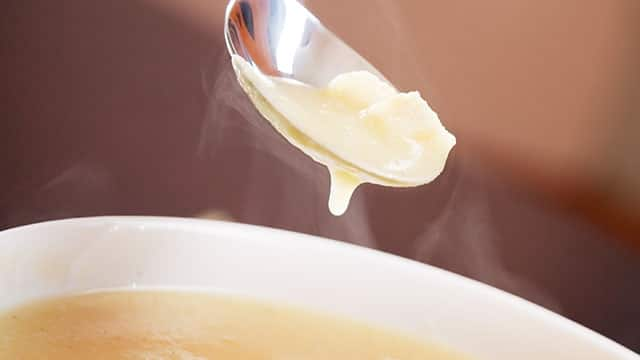Why Soft Foods Are Necessary
Eating soft foods after dental surgery is necessary to ensure proper healing. Oral surgery can include any tooth extraction, periodontal surgery, implants, or surgery on the root of your tooth. Oral surgery requires you to stick to eating only soft foods to reduce irritation on any open wound or avoid biting with the affected tooth. Your mouth and jaw can also be sore after oral surgery.
Soft Foods to Eat After Dental Work
There are plenty of nutritious foods that don't require much chewing. The American Dental Association recommends these staples:
- Pureed or cream soups
- Oatmeal or cream of wheat
- Cottage cheese
- Soft scrambled eggs
- Yogurt
- Smoothies or shakes
- Mashed potatoes
Whether they're hot or cold, the temperature of drinks and foods can also affect your teeth. Sipping hot beverages while healing from tooth extraction may irritate the gum tissue and complicate the recovery process. Eat warm soups and drink warm drinks, not piping hot!
Soft Foods to Encourage Healing
According to the University of Michigan, eating a balanced diet of enough calories and plenty of protein can help you heal. Protein helps build and repair muscle, skin, and tissue. You can easily get lots of protein from protein powder mixed with milk or water. Or you can soup with beef or chicken broth can add more grams of protein to your meal. There are several soft fruit and veggie options to ensure you get adequate nutrition while healing. For example, you can eat mashed avocado to get the small amount of recommended healthy fat you need per day. Peaches, kiwi, and strawberries are soft and high in vitamin C, which helps repair tissues.
Soft Food Choices Throughout the Day
These restrictions don't have to mean eating the same thing every meal. While drinking milkshakes or smoothies for breakfast, lunch, and dinner are tempting, these options tend to have lots of sugar, and sugar can increase your chances of gingivitis. Here are some ideas for breakfast, lunch, and dinner:
Breakfast:
- Soft scrambled eggs
- Oatmeal or cream of wheat
- Low-sugar yogurt
Lunch:
- Butternut squash
- Mashed potatoes with sour cream
- Lentil soup
Dinner:
- Tilapia or other white fish with light seasoning
- Steamed soft veggies like squash or peas
- Polenta or grits
Slowly Returning to Crunchy Foods
Your dentist or oral surgeon will tell you when it's okay to start trying crunchy or hard foods like chips, cereals, or crunchy vegetables. You can ask your oral care professional for more specific instructions. It varies by the case of how long your dentist or oral surgeon may advise sticking to a soft food diet. Follow your aftercare instructions to keep your mouth healthy during the healing process and beyond.
Oral Care Center articles are reviewed by an oral health medical professional. This information is for educational purposes only. This content is not intended to be a substitute for professional medical advice, diagnosis or treatment. Always seek the advice of your dentist, physician or other qualified healthcare provider.
ORAL HEALTH QUIZ
What's behind your smile?
Take our Oral Health assessment to get the most from your oral care routine
ORAL HEALTH QUIZ
What's behind your smile?
Take our Oral Health assessment to get the most from your oral care routine














